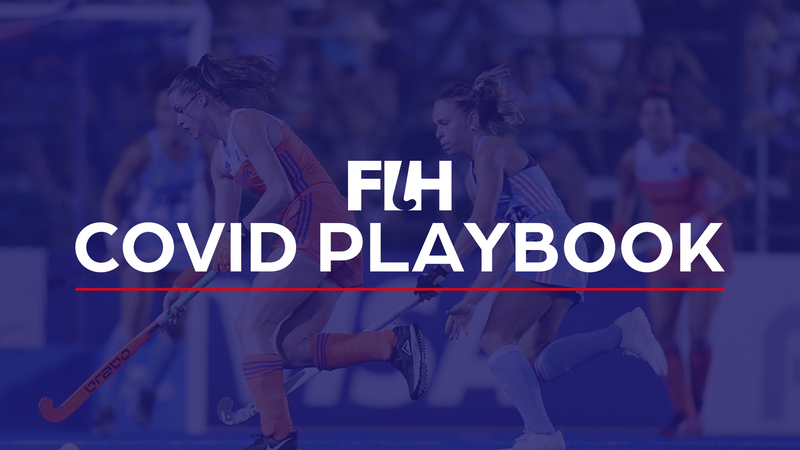
The FIH Playbook, which is the guidance document for FIH tournament protocols during the Covid Pandemic has been a moveable feast since its launch back in May 2020. As the pandemic raged across the globe, effectively putting society, and of course sport, on hold, so hockey had to get used to a new normal.
Except there was no ‘normal’. The situation was unprecedented and therefore called for dynamic responses. During the creation of the Playbook, FIH Director of Sport and Development, Jon Wyatt, called on the expertise and advice of people from a wide range of backgrounds.
The document aims to provide a guideline for all those involved in the delivery of FIH events. This includes hosts, teams, officials, media and broadcasters and it focuses on providing a safe playing environment for everyone involved.
Some of the guidelines will have become second nature now. Wearing of face masks, washing hands, socially distancing – these have all become part and parcel of everyday life. The concept of a team bubble, where everyone involved in a team, including support staff and officials, is something that has grown out of the knowledge gained in the past year.
Vaccinations are also a later addition to the original guidelines. In May 2020, vaccinations were way in the future. Now they are very much a reality and the FIH is working closely with the national associations to encourage athletes, officials and stakeholders to be vaccinated before travelling to an event.
It is a similar situation when it comes to medical facilities at events. The provision of Covid officers for teams, Covid isolation rooms at hotels and Covid referral hospitals are all developments that could not have been foreseen back in early 2020.
As international matches come back onto the calendar, so the Playbook outlines travel guidelines. This includes detailed advice on how to keep everyone as safe as possible on flights, transits from the airport and travel to and from the ground.
By complying with all the protocols, including regular testing and maintenance of team bubbles, outlined in the Playbook, by the time the teams and officials arrive at a stadium, it is reasonable to assume that the matches can be played under as normal conditions as possible.
It is also important that the sport is seen to be observing all Covid restrictions so on-field behaviour such as spitting is punishable with a card and huddles or goal celebrations are heavily discouraged.
Jon Wyatt has been at the heart of developing the FIH Playbook and he explained how it was important that the guidelines remained quite generic, so they could be adapted to meet local rules and government protocols.
“Whilst the COVID circumstances around the world are continually changing, hopefully for the better as the vaccine programmes are rolled out, we felt it was important to provide some principles which can be followed for all hockey events, and obviously then adapted in line with local rules and Government protocols,” said Wyatt.
“As such, the document has been kept quite generic. It has been challenging, and will be updated regularly, but it is an important document and part of our duty to help all involved in hockey events around the world to get back up and running and onto hockey pitches everywhere.”
Of course hockey is far from alone in this regard and there has been plenty of collusion with other sports to adopt best practices. However, as Wyatt points out, there are some situations that are specific to hockey and these can be both helpful – hockey is an outdoor sport and there is no need to touch the ball with their hands – or a hindrance – indoor hockey is played indoor and defenders at penalty corners (pre-Covid) used to share protective equipment.
Aside from learning from within hockey and from other experiences of other sports, there has been many other inputs. These include the FIH document Return to Hockey and Pro League guides, the IOC/Tokyo2020 Playbooks, World Health Organization guides and COVID guidelines from other sporting events that have taken place.
As Wyatt says: “We hope the Playbook is a helpful resource for our national associations and continental federations who are planning upcoming hockey events and that it contributes towards providing safe environments for players, coaches, officials, the hockey media and spectators to get back to hockey events in the coming weeks and months.”
#FIHCovidPlaybook
























